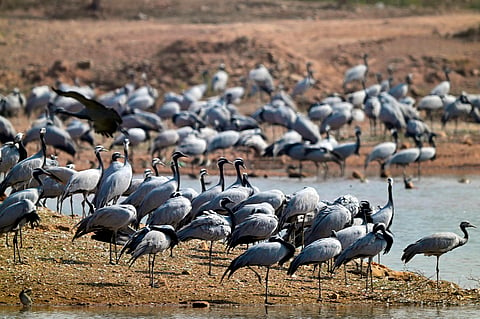Book Review: Navigating the complex waters of wetland governance
Wetlands are ecosystems that play a significant role in maintaining the vital ecological integrity of the biosphere. Ecological and economic well-being go hand in hand. The ecological well-being of the planet’s wetland ecosystems is at stake, and so are the socioeconomic contributions these ecosystems offer.
Wetlands provide exceptionally hospitable habitats for numerous life forms, including fish and countless other aquatic animals, plants, microorganisms, wildlife, and birds on the one hand, and serve as the basis of livelihoods for a large proportion of humanity worldwide, on the other. Their vital ecological functions also include the absorption of excess rainwater, recharging of aquifers, replenishment of groundwater, and mitigation of floods. On the socioeconomic front, wetlands offer opportunities like recreation, swimming, boating, bird watching, water sports, etc. And, above all, wetlands provide the most needed services for the well-being of the whole biosphere by functioning as essential carbon sinks, thus phenomenally contributing to climate change mitigation by controlling the biosphere’s thermodynamics.
However, the Earth’s wetlands are among the least talked about and, undoubtedly, rarely addressed ecosystems. There is a considerable gap between their significance in the maintenance of the biosphere’s health and what has been done to address pertinent contemporary issues facing these fast-dying ecosystems due to undesirable and unwelcome anthropogenic activities. This gap has been filled up by the awesome work of Dinesh K Marothia titled Multiuse Wetlands Governance: Challenges and Institutional Choices. Environmentalists, ecologists, economists, social scientists, governing institutions, and the general public all are to find enlightening content in this book inviting their attention and offering valuable solutions pertaining to the fast-dying ecosystems that have been part and parcel of socioeconomic and cultural life.
Marothia’s work is an insightful exploration of the complexities and intricacies of wetland management, focusing on the multifaceted challenges and the diverse institutional choices available for an effective environmental management. The book proficiently addresses the interplay between environmental sustainability, social equity, and economic viability, recognising that wetlands, in addition to being crucial ecological entities, are also socioeconomic and cultural assets. The author meticulously examines how various stakeholders, including local communities, governments, and private entities, interact within these ecosystems and the impacts of their actions on wetland health and functionalities.
One of the book’s strengths lies in its deep and detailed examination of wetland governance challenges. Marothia thoroughly examines the complex issues of policy fragmentation, competing land uses, and conflicting interests among stakeholders. He highlights the need for integrated management approaches that transcend traditional sectoral boundaries, advocating for the policies that are both inclusive and adaptive to changing environmental and socioeconomic conditions.
The book provides a thorough analysis of various institutional frameworks and their effectiveness in wetland governance. Marothia evaluates different governance models, from centralised governmental control to community-based management. He elaborates his views by presenting case studies from various regions to illustrate successes and failures. His critical assessment of these models, workable as well as non-workable, offers valuable insights into the conditions under which specific institutional arrangements can be successful. He beautifully emphasises the importance of context-specific solutions.
Marothia does not stop at theoretical discussions; he also provides marvellous practical recommendations and policy implications. His suggestions for improving governance structures are grounded in empirical research and real-world examples, making them credible and actionable. Developing multi-stakeholder platforms, the enhancement of legal frameworks, and the promotion of participatory governance practices leading to empowerment of local communities are the fundamentals that can be drawn from the book for on-field operationalisation.
Although rooted in scholarly rigour (as the author himself is an outstanding scholar), it is also accessible to a broader audience, including policymakers, practitioners, and students in various disciplines. Marothia’s clear, field-experience-based, and engaging writing style, combined with well-organised chapters and illustrative case studies, makes the complex subject matter approachable without compromising depth and detail.
Dinesh K Marothia’s Multiuse Wetlands Governance: Challenges and Institutional Choices is an essential read for anyone involved in environmental management and policymaking. It offers a rich blend of theoretical insights and practical guidance, making a compelling case for integrated and inclusive approaches to wetland governance. This inspiring work not only enhances our understanding of the complexities of wetland management but also provides a roadmap for addressing the myriad challenges associated with these vital ecosystems. The book is a significant contribution to the field and a valuable resource for advancing wetland governance practices.
Multiuse Wetlands Governance: Challenges and Institutional Choices by Dinesh K Marothia. Routledge India. 343 pp. ISBN: 1032595140
Vir Singh is Professor Emeritus, Department of Environmental Science, GB Pant University of Agriculture and Technology, Pantnagar, Uttarakhand


